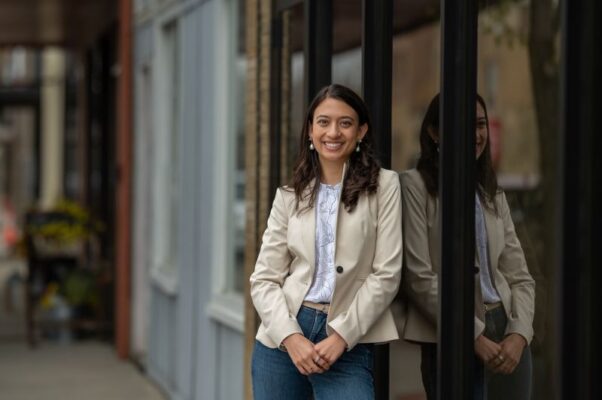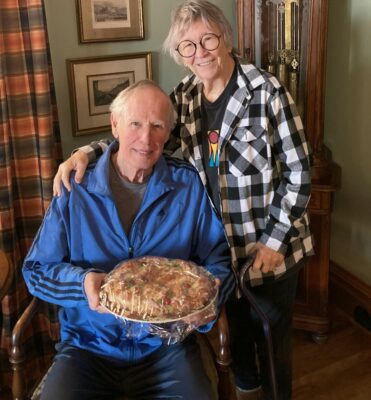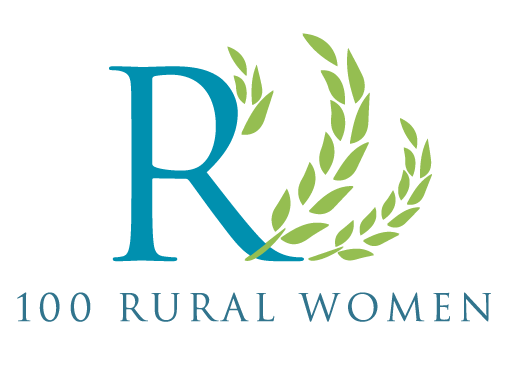Our Work
Check out some articles and features of 100 Rural Women’s work
APRIL 2025
Spotlight on 100 Rural Women: Creating connections and inspiring leadership
 Teresa Kittridge says her life story has often been shaped by a “gap in leadership,” created by the fact that women are significantly underrepresented in formal decision-making roles in rural America.
Teresa Kittridge says her life story has often been shaped by a “gap in leadership,” created by the fact that women are significantly underrepresented in formal decision-making roles in rural America.
“Women are leading every day in (rural) communities. They just are not in formal leadership roles and that’s what we’re trying to see more of. I think that a solution to cut through the political divisiveness in rural (areas) is to have more women leading.” – Teresa Kittridge, Founder and President, 100 Rural Women
The nonprofit, nonpartisan group 100 Rural Women got its jump-start in 2019 when Teresa invited a handful of women to join her in Marcell, Minn. They spent the day focused on needs, assets, and how to better support each other. Every woman in that room raised their hand to help make 100 Rural Women happen.
Our initial research was from 100 meetings we held across the state of Minnesota. All of our programming emanated from that research.” – Teresa Kittridge
The organization sees young women’s leadership as key to the future of rural life. From the beginning, having at least 50% of its board members under the age of 30 has been a priority. Teresa says this effort fit in with a central theme in their programming, which is mentorship. She told us, “I encourage our young women to follow their passion, and I love to watch where they are going. We practice circular mentorship. We mentor them, and they mentor us.”
For example, when COVID-19 brought significant challenges, the younger women on the team helped the organization successfully navigate the pandemic by bringing a virtual approach that continues today. Teresa says it has widened the scope of their efforts to include more national and international connections.
“[COVID-19] pushed us to adapt quickly, get creative, and find new ways to deliver programming, conduct research, and provide support. We’ve had more reach. It’s not perfect, but it removes barriers for women who are balancing so much.” – Teresa Kittridge
Challenges have been and continue to be a concern. Funding is always an issue for small nonprofits. The organization is fortunate to have a few funders who understand the women’s leadership crisis in rural areas. These funders, along with pro bono services and private donations, created a culture of support and have kept 100 Rural Women operating through many financial ups and downs. Nonetheless, Teresa is surprised at how difficult the process has been.
“I am continually astounded by the lack of understanding—and often, interest—among funders regarding the equity gap and the underrepresentation of women in formal leadership roles in rural areas.” – Teresa Kittridge
She says another of the most crucial hurdles to overcome has been working to “build a nonpartisan and non-issue-oriented organization during a time of intense polarization.” With characteristic positivity, Teresa adds, “it has shaped our resilience and focus.”
“I look for those pieces that people can work on together. I work to find two or three things we agree on. People need to feel safe and discuss what’s important to them.” – Teresa Kittridge
In its five years of operation, 100 Rural Women has worked with over 50 interns and graduate students, established multiple partnerships, launched a mailing list of over 5,500 subscribers, and developed innovative and successful programming. Teresa says that she recognizes the importance of continually infusing fresh vision, next-generation leadership, and new energy into the work. Because of this, the year 2025 is focused on evaluation, engagement, visioning, leadership, and sustainability. In May, they are launching a new podcast featuring the stories of 100 rural women. And each day, 100 Rural Women will continue to lead for positive change.
“I’m excited to collaborate….to identify opportunities that will propel our work into the future. It has truly been an honor to be part of this meaningful journey.” – Teresa Kittridge
Listen to the MPR Show Recording
The third season of Rural Voice kicked off at the Minnesota State Fair on Monday, Aug. 26. It was a steamy day, but it didn’t discourage rural change makers who gathered at the MPR booth for a lively and hopeful town hall with moderator Kerri Miller. 100 Rural Women was honored to be part of the conversation.
The question before them: How is rural Minnesota changing, and how are rural communities thriving in the midst of it?
Learn more about Rural Voice
Listen to Ed Souls podcast episode Supporting Rural Women, featuring our founder Teresa Kittridge here.
100 Rural WOmen’s civic work was featured in the Minnesota Tribune. Read the article HERE
100 Rural Women’s work was featured in MINN POST -Including student perspectives. Check out the article HERE
Everywhere Radio features rural leaders and allies spotlighting the good, scrappy, joyful ways rural people are building a more inclusive nation. Click here to listen to the podcast episode.
Everywhere Radio is a production of the Rural Assembly, a coalition dedicated to building more opportunity and better policy for rural communities.
Strong Women is a KAXE/KBXE podcast edition of their on-air and off-air conversations about the lived experience of women in Minnesota, especially women in northern Minnesota. Listen here to learn more about our foundation.
Read about the many factors that led Teresa Kittridge to found 100 Rural Women. Click here for article
Featured Stories
Highlighting the creativity and accomplishments of women in our organization and beyond.
SMIF announces Benya Kraus as next President & CEO

OWATONNA, Minn (May 5, 2025) – Southern Minnesota Initiative Foundation (SMIF) is proud to announce the appointment of Benya Kraus as its next President and CEO, effective June 16, 2025. Benya succeeds Tim Penny, who has served the Foundation with distinction for nearly two decades.
A nationally recognized rural leader and social entrepreneur, Benya brings a deep personal commitment to southern Minnesota and a career defined by advancing rural vitality across the country. As part of a sixth-generation family native to Waseca County, she embodies what it means to choose to live and work in rural Minnesota as a powerful, intentional commitment to community and opportunity.
“Benya represents not just the future of SMIF, but the future of rural philanthropy across Minnesota and beyond,” said Shawn Vogt Sween, SMIF Board Chair. “She brings an extraordinary combination of vision, humility, operational excellence, and a deep personal tie to our region. We could not be more excited for this next chapter.”
Benya most recently served as Network Advancement Director at Resource Rural, supporting a national portfolio of rural development organizations in securing nearly $300 million in federal and state grants over the last year. She previously co-founded and scaled Lead For America, a nationwide nonprofit investing in emerging rural leaders, and led strategic partnerships that secured over $60 million for broadband expansion, early childhood initiatives, and small-town revitalization projects. She holds an MBA from the University of Chicago Booth School of Business with concentrations in finance and entrepreneurship.
Reflecting on her new role, Benya shared, “SMIF has built deep roots by investing in entrepreneurs, supporting young children and families, and strengthening the communities that define this region. I am excited to listen, to learn, and to help plant the seeds for an even stronger future — one rooted in belonging, innovation, and possibility for all who choose this beautiful region as their home.”
Later this summer, Benya and Tim will embark on a listening and relationship-building tour across SMIF’s 20-county region. This series of community conversations and storytelling sessions will spotlight the energy, innovation, and leadership thriving across southern Minnesota. The tour will celebrate how rural philanthropy, through SMIF and the broader Minnesota Initiative Foundation network, is helping to shape the future of Greater Minnesota.
“Southern Minnesota’s future is bright because of leaders like Benya,” said Tim. “The next generation of leadership is going to define the success of this region. Now, as I step into retirement, I am excited to turn this important role over to Benya who carries the same deep commitment to strengthening our rural places.”
SMIF’s President & CEO search was conducted by Ballinger | Leafblad, an executive search firm dedicated to serving the civic sector, partnering with foundations and nonprofits to identify and recruit exceptional leaders.
About Southern Minnesota Initiative Foundation
Southern Minnesota Initiative Foundation (SMIF) is a donor-supported foundation investing for economic growth and community vitality in the 20 counties of south central and southeastern Minnesota. Since 1986, SMIF has invested more than $170 million in the region, supporting entrepreneurship, early childhood development, and community vitality initiatives. SMIF is part of the Minnesota Initiative Foundations, a nationally recognized model for rural philanthropy and regional development. Learn more at www.smifoundation.org.
Media Contact:
Katie Godfrey Demmer, Communications Director
katieg@smifoundation.org
507-214-7022
Link to Article
Tolkkinen: A long-ago good deed by two radiologists has helped women across Minnesota
It’s never too late to follow your dreams.

By Karen Tolkkinen
The Minnesota Star Tribune
ASHBY, MINN. – Dr. June LaValleur took a Danish pastry out of her oven and set it on the counter, part of a six-hour process from start to finish. Flaky, sweet and golden, it would be frosted and dotted with sliced cherries and then delivered to someone special — a long-ago benefactor.
In the early 1980s, when LaValleur was 41, married and the mother of three teenage boys living in Osakis, Minn., she wanted to go to medical school. She’d been accepted at the University of Minnesota Medical School and had already started taking classes. She had no trepidation about starting med school in her 40s, something most people start in their 20s. When she graduated from Ashby High School in 1959, nobody encouraged girls to become doctors. Now that she’d thought of it, she had no money and had been turned down for most loans. And medical school was expensive.
Enter a pair of Alexandria, Minn., radiologists, Dale Undem and Richard Eiser. They heard about LaValleur’s need from Undem’s wife, Jo, who was friends with June, and they agreed without hesitation to finance her education, interest-free.
“We had the assets,” Eiser recalled. “It was no big deal.”
Little did he know that the outspoken, determined friend of his partner’s wife would help change women’s health care throughout the state.
Eiser’s wife, Eileen, said they rarely thought about the loan. There was no paperwork, no promissory note, no breakdown of expenses. They never worried about being repaid. It was just something good they could do, so they did it.
LaValleur finished medical school and then her residency. It was tough being away from her family. She had asked them to come with her to the Twin Cities, but they wanted to stay at home in Osakis, two hours away. On weekends, she stayed with them, driving to the Twin Cities early Monday mornings and driving home on Fridays. She hired an Osakis woman to be at their home in the afternoon so that the boys would never come home from school to an empty house before her husband got home from work. That expense, too, was covered by the radiologists.
It was in her last year of residency that she had a blunt conversation with the head of the university’s OB/GYN department. She told him his department did a terrible job of educating students about menopause. Only she didn’t use the word “terrible.” She used a much stronger adjective, one we can’t reprint in a family newspaper.
Even though menopause can cause hot flashes, night sweats, palpitations, painful sexual intercourse, mood changes and memory problems, among other problems, medical students at the time barely learned anything about it. And LaValleur was not one to stay quiet.
The director didn’t get offended. Instead, he offered her a job in his department as head of the newly created Mature Women’s Center.
“I had planned on returning to the Alexandria area, but after a great deal of thought I decided I could make more of a difference by teaching hundreds of students and residents than seeing one patient at a time,” LaValleur said.
Over the next 15 years, she conducted research, saw patients, and trained thousands of medical students and interns.
“What I emphasized was menopause affects every woman differently,” she said. “Some have symptoms. Some do not. You need to listen to them. And if they have symptoms that they want treated you need to know how to do that.”
The field was ripe for study. How did menopause affect women’s hearts? What treatments would help? Was hormone replacement therapy helpful? Alongside dozens of other university investigators, LaValleur helped advance knowledge of women’s health through national studies like the Women’s Health Initiative and the Heart and Estrogen (HERS) Study.
Once she started earning a salary, LaValleur paid the Alexandria doctors back over 10 years. But she will never forget how they made her new life possible, and ever since, each December, she makes them their holiday Danish. It’s a tedious and time-consuming process, hours of rolling and folding the dough, and then letting it sit, and then braiding it and shaping it. But the end product is a thing of beauty.
LaValleur is 83 now. Retired, she splits her time between Ashby and a small town near the Iowa border. She was raised on a farm and spent most of her life in rural Minnesota, and she worries about rural areas. There aren’t enough pharmacies and not enough labor and delivery services. She wishes family physicians would learn to perform C-sections before they practice in a rural area. It would be so helpful.
Her work has been recognized several times by the medical community, and she has served on numerous medical boards and committees. More importantly, if you’re going through menopause, and your doctor listens to your symptoms, and is able to prescribe a solution that works, maybe that’s LaValleur’s influence, made possible by long-ago help from a pair of Alexandria radiologists.
Undem died in 2008, but LaValleur still visits Eiser and his wife.
“They need to know how important what they did for me was,” she said. “I never wanted them to forget it. I held them in high esteem.”
University of Minnesota Regional Sustainable Development Partnership (RSDP) for recognizing this amazing civic leader and for your support of our work at 100 Rural Women!published an article “Rural Women Rising” Despite serving as mayor of Ashby, Minn., Amy Johnson says the idea of entering politics initially felt out of reach. learn more about Amy’s civic leadership journey. Click Here to read.
Welcome to Rural Food Traditions, a podcast series of Rural Remix, where many meals across diverse food traditions begin: with bread. Food is a uniter; and across culinary traditions, bread is a common thread. On this episode, we are speaking with Minnesotan Cheryl Whitesitt about her grandmother’s recipe for white bread. Cheryl makes the recipe with her children and grandchildren.
CNN honors Sanford Bemidji Johnna Nynas, M.D. on its Champions for Change program
Dr. Johnna Nynas | Obstetrics & Gynecology
More than 46 million Americans, or 15 percent of the U.S. population, live in rural areas as defined by the U.S. Census Bureau, regions where pregnant women struggle to access the care they need. Dr. Johnna Nynas is passionate about getting pregnancy care to women in rural towns like the one she grew up in, and is using innovative methods to provide vital access to medical care. LINK to video



